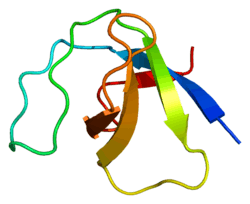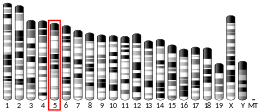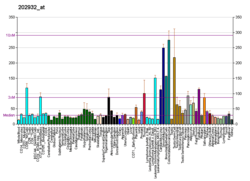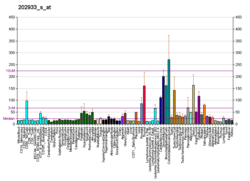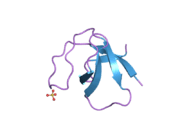YES1
Proto-oncogene tyrosine-protein kinase Yes is an enzyme that in humans is encoded by the YES1 gene.[5][6]
This gene is the cellular homolog of the Yamaguchi sarcoma virus oncogene. The encoded protein has tyrosine kinase activity and belongs to the src family of proteins. This gene lies in close proximity to thymidylate synthase gene on chromosome 18, and a corresponding pseudogene has been found on chromosome 22.[6]
Interactions
YES1 has been shown to interact with Janus kinase 2,[7] CTNND1,[8] RPL10[9] and Occludin.[10]
References
- GRCh38: Ensembl release 89: ENSG00000176105 - Ensembl, May 2017
- GRCm38: Ensembl release 89: ENSMUSG00000014932 - Ensembl, May 2017
- "Human PubMed Reference:". National Center for Biotechnology Information, U.S. National Library of Medicine.
- "Mouse PubMed Reference:". National Center for Biotechnology Information, U.S. National Library of Medicine.
- Semba K, Yamanashi Y, Nishizawa M, Sukegawa J, Yoshida M, Sasaki M, Yamamoto T, Toyoshima K (Mar 1985). "Location of the c-yes gene on the human chromosome and its expression in various tissues". Science. 227 (4690): 1038–40. Bibcode:1985Sci...227.1038S. doi:10.1126/science.2983418. PMID 2983418.
- "Entrez Gene: YES1 v-yes-1 Yamaguchi sarcoma viral oncogene homolog 1".
- Fuhrer, D K; Yang Y C (Jul 1996). "Complex formation of JAK2 with PP2A, P13K, and Yes in response to the hematopoietic cytokine interleukin-11". Biochem. Biophys. Res. Commun. 224 (2): 289–96. doi:10.1006/bbrc.1996.1023. ISSN 0006-291X. PMID 8702385.
- Piedra, Jose; Miravet Susana; Castaño Julio; Pálmer Héctor G; Heisterkamp Nora; García de Herreros Antonio; Duñach Mireia (Apr 2003). "p120 Catenin-associated Fer and Fyn tyrosine kinases regulate beta-catenin Tyr-142 phosphorylation and beta-catenin-alpha-catenin Interaction" (PDF). Mol. Cell. Biol. 23 (7): 2287–97. doi:10.1128/MCB.23.7.2287-2297.2003. ISSN 0270-7306. PMC 150740. PMID 12640114.
- Oh, Hyung Suk; Kwon Haeyoung; Sun Suk Kyun; Yang Chul-Hak (Sep 2002). "QM, a putative tumor suppressor, regulates proto-oncogene c-yes". J. Biol. Chem. 277 (39): 36489–98. doi:10.1074/jbc.M201859200. ISSN 0021-9258. PMID 12138090.
- Chen, Yan-Hua; Lu Qun; Goodenough Daniel A; Jeansonne Beverly (Apr 2002). "Nonreceptor tyrosine kinase c-Yes interacts with occludin during tight junction formation in canine kidney epithelial cells". Mol. Biol. Cell. 13 (4): 1227–37. doi:10.1091/mbc.01-08-0423. ISSN 1059-1524. PMC 102264. PMID 11950934.
Further reading
- Brickell PM (1992). "The p60c-src family of protein-tyrosine kinases: structure, regulation, and function". Critical Reviews in Oncogenesis. 3 (4): 401–46. PMID 1384720.
- Toyoshima K, Semba K, Nishizawa M, et al. (1988). "Nakahara memorial lecture. Non-receptor type protein-tyrosine kinases closely related to src and yes compose a multigene family". Int. Symp. Princess Takamatsu Cancer Res. Fund. 17: 11–20. PMID 3332005.
- Sudol M, Chen HI, Bougeret C, et al. (1995). "Characterization of a novel protein-binding module--the WW domain". FEBS Lett. 369 (1): 67–71. doi:10.1016/0014-5793(95)00550-S. PMID 7641887.
- Summy JM, Sudol M, Eck MJ, et al. (2004). "Specificity in signaling by c-Yes". Front. Biosci. 8 (6): s185–205. doi:10.2741/1011. PMID 12456296.
- Cichowski K, McCormick F, Brugge JS (1992). "p21rasGAP association with Fyn, Lyn, and Yes in thrombin-activated platelets". J. Biol. Chem. 267 (8): 5025–8. PMID 1544885.
- Huang MM, Bolen JB, Barnwell JW, et al. (1991). "Membrane glycoprotein IV (CD36) is physically associated with the Fyn, Lyn, and Yes protein-tyrosine kinases in human platelets". Proc. Natl. Acad. Sci. U.S.A. 88 (17): 7844–8. Bibcode:1991PNAS...88.7844H. doi:10.1073/pnas.88.17.7844. PMC 52400. PMID 1715582.
- Holtrich U, Bräuninger A, Strebhardt K, Rübsamen-Waigmann H (1992). "Two additional protein-tyrosine kinases expressed in human lung: fourth member of the fibroblast growth factor receptor family and an intracellular protein-tyrosine kinase". Proc. Natl. Acad. Sci. U.S.A. 88 (23): 10411–5. Bibcode:1991PNAS...8810411H. doi:10.1073/pnas.88.23.10411. PMC 52938. PMID 1720539.
- Krueger J, Zhao YH, Murphy D, Sudol M (1991). "Differential expression of p62c-yes in normal, hyperplastic and neoplastic human epidermis". Oncogene. 6 (6): 933–40. PMID 2067846.
- Zhao YH, Krueger JG, Sudol M (1991). "Expression of cellular-yes protein in mammalian tissues". Oncogene. 5 (11): 1629–35. PMID 2267131.
- Sukegawa J, Semba K, Yamanashi Y, et al. (1987). "Characterization of cDNA clones for the human c-yes gene". Mol. Cell. Biol. 7 (1): 41–7. doi:10.1128/MCB.7.1.41. PMC 365039. PMID 2436037.
- Bull HA, Brickell PM, Dowd PM (1994). "Src-related protein tyrosine kinases are physically associated with the surface antigen CD36 in human dermal microvascular endothelial cells". FEBS Lett. 351 (1): 41–4. doi:10.1016/0014-5793(94)00814-0. PMID 7521304.
- Toshima J, Ohashi K, Iwashita S, Mizuno K (1995). "Autophosphorylation activity and association with Src family kinase of Sky receptor tyrosine kinase". Biochem. Biophys. Res. Commun. 209 (2): 656–63. doi:10.1006/bbrc.1995.1549. PMID 7537495.
- Courtneidge SA, Dhand R, Pilat D, et al. (1993). "Activation of Src family kinases by colony stimulating factor-1, and their association with its receptor". EMBO J. 12 (3): 943–50. doi:10.1002/j.1460-2075.1993.tb05735.x. PMC 413295. PMID 7681396.
- Mori S, Rönnstrand L, Yokote K, et al. (1993). "Identification of two juxtamembrane autophosphorylation sites in the PDGF beta-receptor; involvement in the interaction with Src family tyrosine kinases". EMBO J. 12 (6): 2257–64. doi:10.1002/j.1460-2075.1993.tb05879.x. PMC 413454. PMID 7685273.
- Waltenberger J, Claesson-Welsh L, Siegbahn A, et al. (1994). "Different signal transduction properties of KDR and Flt1, two receptors for vascular endothelial growth factor". J. Biol. Chem. 269 (43): 26988–95. PMID 7929439.
- Silverman GA, Kuo WL, Taillon-Miller P, Gray JW (1993). "Chromosomal reassignment: YACs containing both YES1 and thymidylate synthase map to the short arm of chromosome 18". Genomics. 15 (2): 442–5. doi:10.1006/geno.1993.1086. PMID 8449516.
External links
- Overview of all the structural information available in the PDB for UniProt: P07947 (Tyrosine-protein kinase Yes) at the PDBe-KB.
This article is issued from Wikipedia. The text is licensed under Creative Commons - Attribution - Sharealike. Additional terms may apply for the media files.
